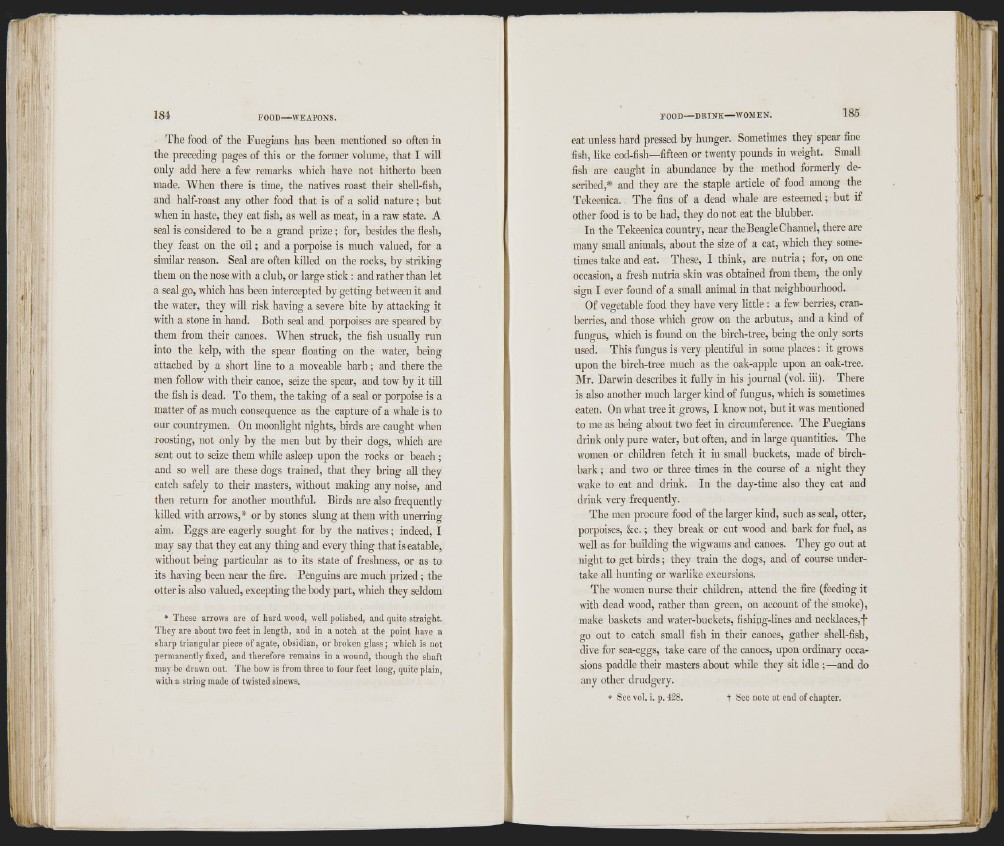
■ ..'T
if
7 7 ;
ifi
«u:n
1; . :h
184 FOOD WEAPONS.
The food of the Fuegians has been mentioned so often in
the preceding pages of this or the former volume, that I will
only add here a few remarks which have not hitherto been
made. When there is time, the natives roast their shell-fish,
and half-roast any other food that is of a solid nature; but
when in haste, they eat fish, as well as meat, in a raw state. A
seal is considered to be a grand prize; for, besides the flesh,
they feast on the o il; and a porpoise is much valued, for a
similar reason. Seal are often killed on the rocks, by striking
them on the nose with a club, or large stick : and rather than let
a seal go, which has been intercepted by getting between it and
the water, they will risk having a severe bite hy attacking it
with a stone in hand. Both seal and porpoises are speared by
them from their canoes. When struck, the fish usually run
into the kelp, with the spear floating on the water, being
attached by a short line to a moveable barb ; and there the
men follow with their canoe, seize the spear, and tow hy it till
the fish is dead. To them, the taking of a seal or porpoise is a
matter of as much consequence as the capture of a whale is to
our countrymen. On moonlight nights, birds are caught when
roosting, not only by the men but by their dogs, which are
sent out to seize them while asleep upon the rocks or beach ;
and so well are these dogs trained, that they bring all they
catch safely to their masters, without making any noise, and
then return for another mouthful. Birds are also frequently
killed with arrows,* or by stones slung at them with unerring
aim. Fggs are eagerly sought for by the natives; indeed, I
may say that they eat any thing and every thing that is eatable,
without being particular as to its state of freshness, or as to
its having been near the fire. Penguins are much prized ; the
otter is also valued, excepting the body part, which they seldom
• T h e s e arrows a re o f h a rd wood, well polished, and quite stra ig h t.
T h e y a re about two feet in len g th , an d in a notch a t the p o in t have a
sh a rp tria n g u la r piece o f a g ate, obsidian, o r b ro k en g la s s ; which is not
permanently fixed, and th e re fo re remains in a wound, th o u g h th e sh a ft
may be drawn out. T h e bow is from th re e to fo u r fe e t long, quite plain,
with a s trin g m ade o f tw isted sinews.
FOOD— DRINK WOMEN. 185
eat unless hard pressed by hunger. Sometimes they spear fine
fish, like cod-fish—fifteen or twenty pounds in weight. Small
fish are caught in abundance by the method formerly described,*
and they are the staple article of food among the
Tekeenica.. The fins of a dead whale are esteemed; but if
other food is to be had, they do not eat the blubber.
In the Tekeenica country, near theBeagleChannel, there are
many small animals, about the size of a cat, which they sometimes
take and eat. These, I think, are nutria ; for, on one
occasion, a fresh nutria skin was obtained from them, the only
sign I ever found of a small animal in that neighbourhood.
Of vegetable food they have very little : a few berries, cranberries,
and those which grow on the arbutus, and a kind of
fungus, which is found on the birch-tree, being the only sorts
used. This fungus is very plentiful in some places: it grows
upon the birch-tree much as the oak-apple upon an oak-tree.
Mr. Darwin describes it fully in his journal (vol. hi). There
is also another much larger kind of fungus, which is sometimes
eaten. On what tree it grows, I know not, but it was mentioned
to me as being about two feet in circumference. The Fuegians
drink only pure water, but often, and in large quantities. The
women or children fetch it iu small buckets, made of birch-
bark; and two or three times in the course of a night they
wake to eat and drink. In the day-time also they eat and
drink very frequently.
The men procure food of the larger kind, such as seal, otter,
porpoises, &c. ; they break or cut wood and bark for fuel, as
well as for building the wigwams and canoes. They go out at
night to get birds; they train the dogs, and of course undertake
all hunting or warlike excursions.
The women nurse their children, attend the fire (feeding it
with dead wood, rather than green, on account of the smoke),
make baskets and water-buckets, fishipg-lines and necklaces,!
go out to catch small fish in their canoes, gather shell-fish,
dive for sea-eggs, take care of the canoes, upon ordmary occasions
paddle their masters about while they sit idle ;—and do
any other drudgery.
* See vol. i. p. 428. t See note a t end of ch ap ter.
I'0
07
II'
i j ;
;
*
iiiii